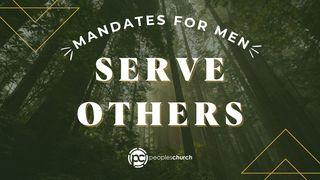Christmas VocationsSample

You just discovered a piece of earth-shattering news. You pull open Twitter or Instagram to share it, but you know you’re going to need some help to spread the message. Who will you tag in your post? @CNN? @POTUS? @TaylorSwift13? If the news is religious in nature, maybe you’ll tag @Pontifex or @YouVersion?
Those would all be logical choices. But you probably wouldn’t tag a farmer with a dozen followers who hasn’t logged into his Twitter account in years. But that’s basically who the angels share the “good news” of Christmas with first—shepherds—one of the lowliest vocations of that time.
Then some 30-odd years later, we see Jesus doing the same thing. When he kicked off his public ministry, Jesus didn’t enlist the help of Pharisees or other religious professionals to help him spread the gospel of his kingdom. Instead, he called fishermen and tax collectors.
What’s my point? While God certainly spreads the gospel through pastors and “full-time missionaries” today, he also—dare I say primarily—spreads it through you and me, regular believers working as entrepreneurs, accountants, zookeepers, artists, politicians, and mechanics.
Ever since the angels appeared in the shepherds’ field, God has made it crystal clear that the work of proclaiming the gospel is not reserved for religious professionals. It is the call of everyone who believes.
Don’t wait for a missions trip to see yourself as a missionary. Like the shepherds, embrace your work today—whatever that work is—as a vehicle for sharing the good news that a “Savior has been born!”
If you enjoyed this plan, you’ll love the author's weekly devotional, helping you more deeply connect the gospel to your work. Sign up here.
Scripture
About this Plan

The vocations represented in the characters of Christmas can teach us a lot about God and how our work is a means of co-laboring with “the newborn King.” In this four-day plan, we’ll look at the vocations of Joseph, Zechariah, Mary, and the shepherds to draw out applications for our own work today.
More
Related plans

The Benefits of Shared Spiritual Goals: How Starting as Friends First Enhances Romantic Relationships

Everyday Gospel: A Daily Devotional Connecting Scripture to All of Life

Journey With Jesus 365

Don't Let Doubt Take You Out

Protect Your Peace

Radical Love

Every Place

Sound of Heaven: A 6-Day Devotional by Danny Gokey

Mandates for Men: Serve Others
